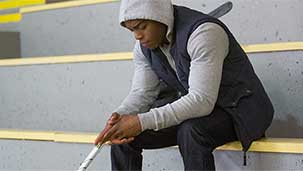A director’s first feature film is always a draw for me. If they make it big, I can be one of those smug assholes who say, “Oh, are you justhearing about them now? How interesting.” Granted, Director X has already made a name for himself – most recently as the guy who brought us the Hotline Bling video.So, to be honest, part of me thought a film by a hot shot music video director might be too enamoured with jump cuts, and all soundtrack, no substance. But Across the Line resists being written off as any one thing, and left me equal parts disappointed and impressed.
Even more than Director X, you’re both to blame and to thank for that.
In your story, high school hockey star Mattie is gunning for the NHL - if he keeps practicing, gets good grades, and stays out of trouble. But Mattie also attends a high school where racial tensions between black and white students lead to regular brawls in the hallways and parking lot, echoing the real-life racially incited violence that has flared up every few years at Nova Scotia’s Cole Harbour High School, most notably in 1989. Making matters worse is Mattie’s increasingly strained relationship with his older brother, the family fuck-up who does terrible things like pimping out girls from school. At first, I had a hard time with the way Mattie often hovers on the periphery of the action, but when you consider the fact that he is always one fight or bogus traffic stop away from losing his shot at pursuing his hockey dreams, it makes sense. The constant run-ins with white kids hurling racial epithets verge on repetitive, but they effectively underscore the notion that for Mattie, every day is essentially a series of booby-traps to be avoided, because the gatekeepers of his opportunities and his ticket out of small-town Nova Scotia are far less accommodating or forgiving of a young black man who excels at a predominantly white sport.
There were a few plot holes and minor irritants that often pulled me out of the story. We are constantly reminded that Mattie is a spectacular hockey player, but we never actually see him do more than leisurely drills on an otherwise empty rink. In a film about a hockey player, there is no actual hockey played at any point, and that bugged me. Given that the narrative alludes to racial inequality in the NHL, and in Canadian hockey in general, could we not have been spared one or two throw-downs before English class in favour of at least one scene that would actually show us the pressures and prejudices Mattie faces as a black hockey player?
I realize that, being an independent Canadian film, there must have been budgetary constraints at play, and maybe it just wasn’t possible to stage any hockey on screen. But when such gaps occur out of necessity, like the lack of hockey, or that Mattie’s English teacher appears to be the only adult present at the high school, the script needs to be strong enough to make them easy to overlook - and in this case, it doesn’t quite get there.
Worst of all Floyd, the dialogue in the film made me cringe. A lot. The narrative raises some heavy issues centered on racial inequality, but the dialogue frequently collapses into cliché, stunted, after school special-like histrionics. There were moments that reminded me of a few mortifyingly awkward anti-racism role playing workshops from my own school days, with hackneyed references to “those people…!” and the inevitable “Can’t we all just get along?!” outburst that I was pretty much able to preemptively recite word for word.
While the script is weak at telling, its strength is in the showing. There are instances of silent interaction between the characters that are masterfully constructed and staged. In a scene where Mattie’s brother drags him along to collect a couple of girls in his employ, Mattie recognizes one of them from school. They make eye contact for an instant before she gets into his car. They sit there in complete silence, but that moment pulls together every narrative thread in the film - Mattie’s family troubles, the appalling racism that poisons the characters’ interactions, and the various risks posed to Mattie’s future. That moment is when Mattie’s desperation to escape to something better is most palpable, and drives home just how high the stakes are for him.
Your script has its weaknesses, but I ultimately liked its ambition. It raises uncomfortable issues of race relations in Canada, reaches back towards an important aspect of Canadian history that is not often spoken about, and tries to illustrate how racism pervades our communities as well as our most well-loved institutions. I won’t be enthusiastically quoting lines from the film any time soon, but I am interested in the conversations it might start - that it should start.
Best,

Nat







